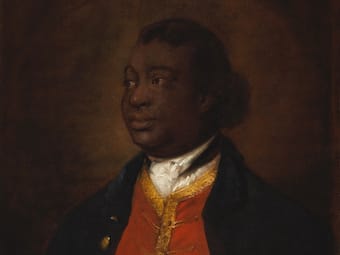Continued from
Part 1
IN Africa, the poor wretched natives
— blessed with the most fertile and luxuriant soil — are rendered so
much the more miserable for what Providence meant as a blessing:
the Christians’ abominable traffic for slaves, and the horrid cruelty
and treachery of the petty Kings, encouraged by their Christian
customers, who carry them strong liquors to enflame their national
madness, and powder and bad fire arms to furnish them with the
hellish means of killing and kidnapping.
But enough: it is a subject that sours my blood, and I am sure
will not please the friendly bent of your social affections.* I
mention these, only to guard my friend against being too hasty in
condemning the knavery of a people, who, bad as they may be — possibly
were made worse by their Christian visitors. Make human nature thy
study wherever thou residest; whatever the religion or the
complexion, study their hearts. Simplicity, kindness, and charity,*
be thy guide; with these, even Savages will respect you — and God
will bless you.
By
Ignatius Sancho
1729-1780
From
‘The Letters of Ignatius Sancho’ (1784), by Ignatius Sancho (1729-1780), edited by Frances Crewe (1748-1818) with a biography by Joseph Jekyll (1754-1837). Punctuation modernised.
Questions for Critics
1. What is the author
aiming to achieve in writing this?
2. Note any words, devices or turns of phrase that
strike you. How do they help the author communicate his
ideas more effectively?
3. What impression does this passage make on you?
How might you put that impression into words?
Based on The English Critic (1939)
by NL Clay, drawing on The New Criticism: A Lecture Delivered at
Columbia University, March 9, 1910, by J. E. Spingarn,
Professor of Comparative Literature in Columbia University,
USA.
Archive
Word Games
For each group of words, compose a sentence that uses all three. You can use any form of the word: for example, cat → cats, go → went, or quick → quickly, though neigh → neighbour is stretching it a bit.
This exercise uses words found in the accompanying passage.
1
All.
Enough.
Respective.
2
Kidnap.
People.
Slave.
3
Chain.
Observe.
Study.
Variations:
1.
include direct and indirect speech
2.
include one or more of these words: although, because, despite, either/or, if, unless, until, when, whether, which, who
3.
use negatives (not, isn’t, neither/nor, never, nobody etc.)
In each group below, you will find words that are similar to one another, but not exactly the same. Compose your own sentences to bring out the similarities and differences between them, whether in meaning, grammar or use.
This exercise uses words found in the accompanying passage.
1.
Appease.
Please.
2.
Its.
It’s.
3.
Kind.
Sort.
4.
Observe.
Watch.
5.
Peace.
Calm.
6.
Peace.
Truce.
7.
Shall.
Should.
8.
Who.
Which.
9.
Worse.
Worst.
For each word below, compose sentences to show that it may be used as an adjective. Adjectives provide extra information about a noun, e.g. a black cat, a round table, the early bird etc..
This exercise uses words found in the accompanying passage.
1
Best.
2
Mean.
3
United.
4
Hasty.
5
Various.
6
Worse.
7
Horrid.
8
Warm.
9
Brotherly.
Variations:
1.show whether your adjective can also be used as e.g. a noun, verb or adverb.
2.show whether your adjective can be used in comparisons (e.g. good/better/best).
3.show whether your adjective can be used in attributive position (e.g. a dangerous corner) and also in predicate position (this corner is dangerous).
Make words by adding vowels to each group of consonants below. You may add as many vowels as you like before, between or after the consonants, but you may not add any consonants or change the order of those you have been given. See if you can beat our target of common words.
prt
(7+2)
See Words
apart.
operate.
part.
pert.
pirate.
port.
uproot.
prat.
prate.
If you like what I’m doing here on Clay Lane,
from time to time you could
buy me a coffee.
Buy Me a
Coffee is a crowdfunding website, used by over a million people. It is designed
to help content creators like me make a living from their work. ‘Buy Me a
Coffee’ prides itself on its security, and
there is no need to register.

Related Posts
Africa’s Competitive Edge
By
David Livingstone
Four years before the bloody American civil war, Dr David Livingstone
proposed a peaceful way to rid the world of slavery.
Read
Picture: © HigorCosta, Wikimedia Commons. Licence: CC BY-SA 4.0..
Source.
Posted
June 16 2018
Disbanding Empire
By
Adam Smith
Adam Smith could not imagine it would ever happen, but he nevertheless recommended that Britain grant independence to her colonies.
Read
Picture: © Ewan Munro, Wikimedia Commons. Licence: CC BY-SA 2.0..
Source.
Posted
March 30 2018
The Spectatress
By
George Canning MP
George Canning urged Britain not to bring Continental Europe’s topsy-turvy politics home by getting too closely involved.
Read
Picture: © Mageslayer99, Wikimedia Commons. Licence: CC BY-SA 3.0..
Source.
Posted
November 25 2017
The Jealousy of Trade
By
David Hume
David Hume encourages politicians to put away their distrust of other countries, and allow free trade to flourish.
Read
Picture: © Ketounette, Wikimedia Commons. Licence: CC-BY-SA 4.0..
Source.
Posted
December 20 2016






